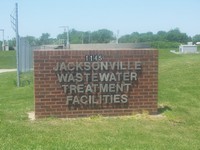The City of Jacksonville has a large municipal waste water system overhaul looming in the distance. Jacksonville replaced its 100-year old water plant in 2017 with a new state of the art facility that cost the city approximately $32 million. The Wastewater Plant, located at 1145 North Main Street on Route 78, has been located along Mauvaisterre Creek since the 1930s, with major updates coming in the early 1970s with more coming in 1988, 1991, and 1992.
According to a presentation by Benton & Associates to the Jacksonville City Council on October 26th, new EPA regulations are going to force the city into a major overhaul at the facility. The facility currently treats at the combined sewer level about 60 million gallons a day and it currently removes about 6.5 million pounds of pollutants annually. Currently, the U.S. EPA is attempting to limit the amount of phosphorus dispersed into the Mississippi River, as Jamie Headen an engineer of Benton & Associates explained because it is creating a dead zone for plant and fish life in the Gulf of Mexico at the mouth of the river: “Lowering the phosphorous disbursement is kind of the bigger picture. There is a time schedule that goes with that. We are going to have a future phosphorous limit that we are going to need to hit between 2025 and 2030. The problem is, everyone’s discharge [from their wastewater plants] goes into the Illinois and Mississippi rivers and it ends up down in Louisiana, and then down on into the gulf. About 12% of the phosphorous that ends up down there ends up coming from point discharges from these municipalities. Some of the rest of that total comes from farming practices and other non-point sources. It creates hypoxia, which is a dead area in the gulf with very low dissolved oxygen at the bottom of the ocean. We are trying to limit those nutrients to restore the health of the Gulf.”
Headen says they have a goal of getting phosphorus disbursement down to 8 million pounds per year to slow the hypoxia growth in the gulf. For the City of Jacksonville, it means major upgrades for their facilities.
Cameron Jones, another engineer who was involved in the study, says that most of the mechanical equipment at the is beyond its useful life: “Portions of the plant are in upwards of 50 years old that are concrete structures and such. Other portions are 31 years old, with minor maintenance and upgrades as it has gone along. As we look at the Waste Water Plant in general, it is a very corrosive and aggressive environment and so the mechanical equipment that is installed at the Waster Water Treatment Plant has a normal, useful life of about 20 years. Right now, we are going on about 30-31 years since the last major upgrade at the facility. Your operation staff have done an amazing job at keeping the facilities operational and working well. If these improvements are implemented over the next 10 years, some of these processes may be 40 years old before they actually have their next upgrades.”
Rather than completely rebuild, Benton & Associates suggested the council due a major rehabilitation in 4 separate phases over the next decade. The phasing will allow the city to seek major grants from the State of Illinois to cover portions of the cost over the next decade. It would also allow the city to maximize the grant process. If the design process is permitted to move forward, engineering designs would begin in January.
The total cost to the city at the completion of the projection over the next decade would be a little under $35.6 million.




